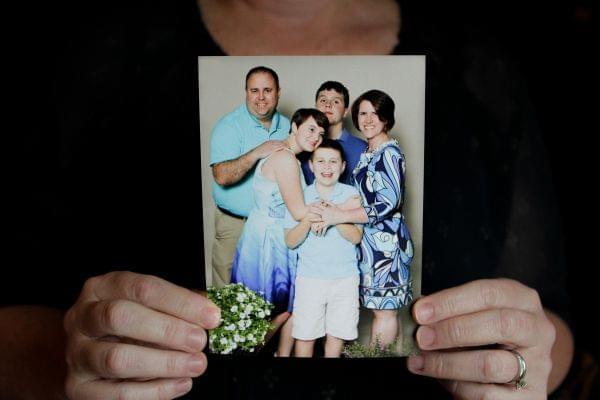Custody Or Care: Ohio May Help Parents Deal With Mental Illness

Julie Callahan shows a picture of her family, including her son Jackson, who is non-verbal autistic. She says relinquishing custody was the last option left. Paige Pfleger/WOSU
Across the United States, parents of children with severe mental health issues can face an excruciating decision: If they can't afford costly healthcare, they may have to sign over custody to the state. That way, the government will pay for the child's care. Now those parents are fighting for change, and a chunk of Ohio's budget.
As a child, Andrew Butler was diagnosed as non-verbal autistic with a severe intellectual disability. When he had outbursts, his dad Mark Butler would wrap his arms around his son.
Now Andrew is 6’2’’ and more than 200 pounds. Holding him isn’t an option anymore.
Experts told Butler: when Andrew is acting out, run.
“I remember one Thanksgiving where he was having this outburst right in the middle of Thanksgiving dinner, and our evacuation plan was, 'Everybody run to the basement and lock the door,'” Butler says. “I remember that Thanksgiving I didn’t move. I thought, it’s Thanksgiving, I’m going to eat my Thanksgiving dinner. And I got hurt pretty bad.”
Andrew would hit his family members, punch holes in the walls, bite himself and others. Social workers told Butler that Andrew needed to be put into a residential treatment center to balance his medications and unlearn his violent behavior.
But Medicaid wouldn’t pay for it, nor would Butler’s private insurance. That left the family with only one option.
“The only way to get him that care that he needed was to call our children services agency,” Butler says. “And ultimately, in order for them to fund that care, we would have to surrender custody to the state.”

Mark Butler's son Andrew needed to be placed in a residential mental health treatment center, but insurance wouldn't pay. So he had to relinquish custody to the state.
Some families like Butler’s give up custody when they run out of other choices. Other families report feeling forced into it, or having the custody of their other children be threatened.
It’s unclear how often this happens, because most states don’t keep track of the numbers. One study showed at least 12,000 families in 19 states had given their kids up just to get them mental health care.
“Imagine if you had a kid that was suffering from an illness like leukemia,” Butler says. “And in order to get the medical treatment that they needed, the state was saying, ‘O.K., in order for your child to get the treatment they need, they’re our kid now.’ That’s basically what we’ve been going through.”
Butler has been talking to Ohio lawmakers about ways to fund care and keep families together.
Gov. Mike DeWine’s budget proposed doubling aid for family and children services, which would increase funding for multi-system youth – kids like Andrew, whose mental health issues puts them at risk of entering the foster care or justice system.
"My hope is that my colleagues will understand that spending this money now really helps avoid a lot of issues later," says state Rep. Sarah LaTourette. "This isn’t like if we don’t spend this money on kids in foster care now then we’re going to save it down the road. Down the road it’s going to lead to increased costs, and perhaps a lot of bad outcomes for these kids."
Connecting families with funding is the first step, LaTourette says. But she cautions some of her fellow lawmakers who proposed ending forced relinquishment altogether.
"That sounds wonderful, but the unfortunate end result of that could be these kids really have nowhere to turn then," she says.
For Julie Callahan, relinquishing custody was the last option for her son, Jackson. He’s non-verbal autistic and harms himself and others.
"He would put his head through walls, he put his head through my car window, my glass cabinet, he’s broken windows with his head," she says. "He will bring his knee up to his face and he’s broken his nose from doing that."
After giving up custody of Jackson a few months ago, Callahan says her family is in the process of healing. Her youngest son has PTSD from the violence in the home. Callahan is still working to patch up the holes Jackson left in the walls.
Right now, Jackson is in a psychiatric unit in Cincinnati. Callahan is waiting to find out what state he will be sent to for long-term treatment. Because she doesn't have custody, she doesn't get a say.
But, like Butler, Callahan is speaking up about state policy, so other families don’t have to trade custody for care.
This story was produced by Side Effects Public Media, a news collaborative covering public health.
